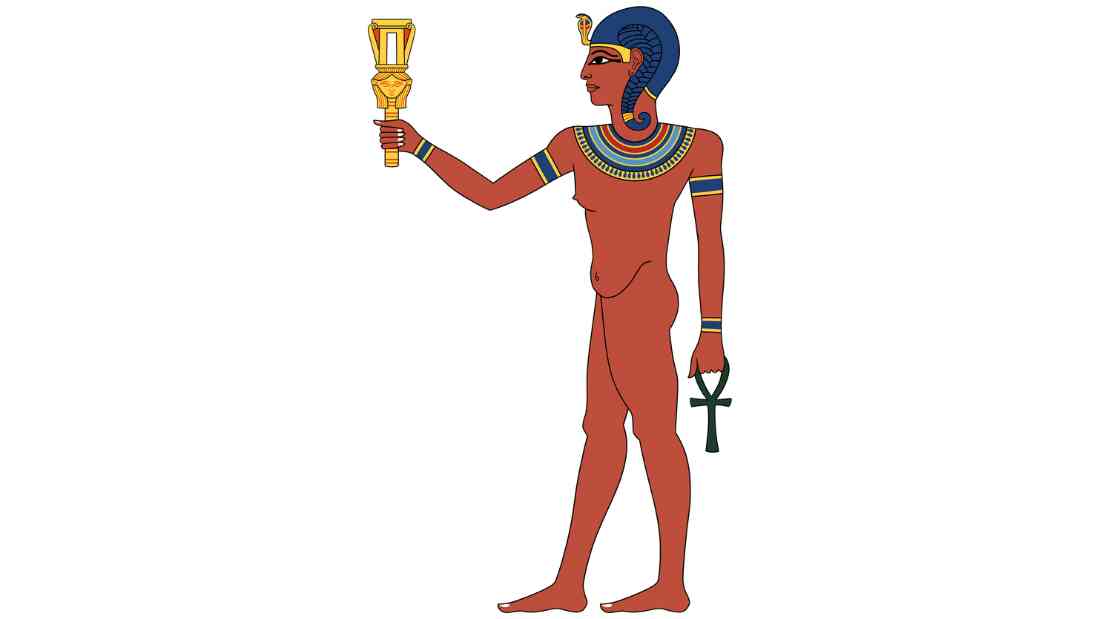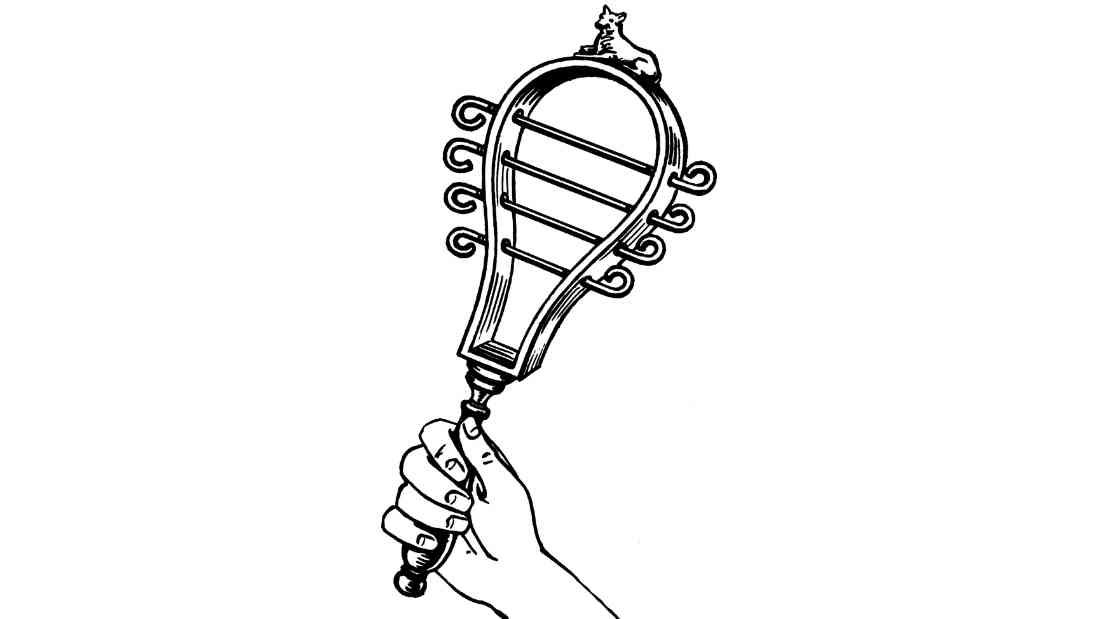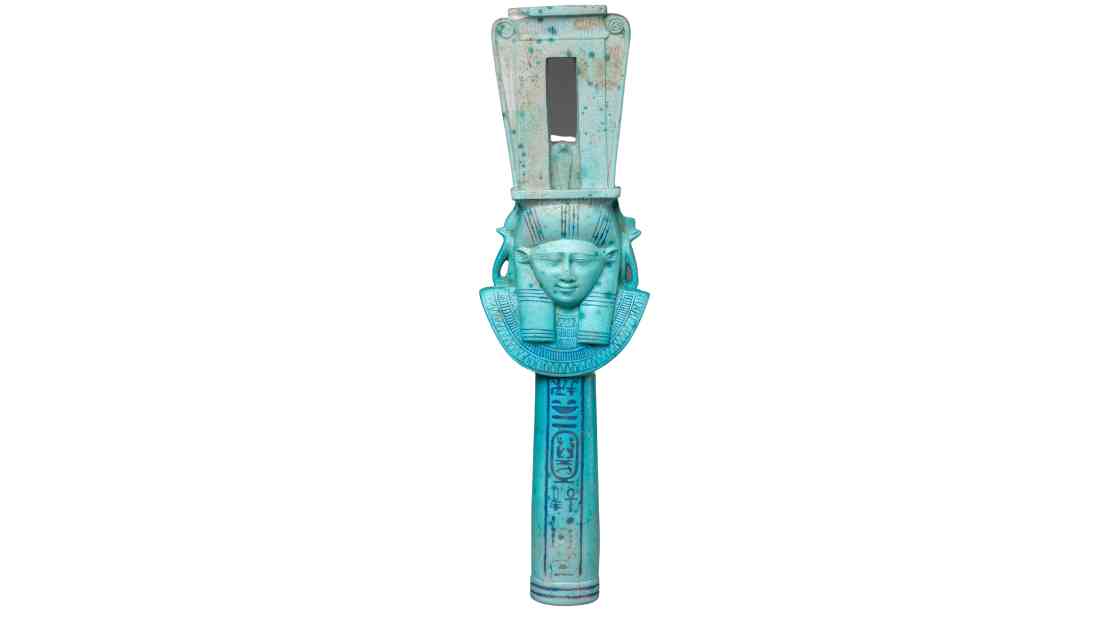Music has always been a universal language, a vehicle for expression and communication that transcends cultural and temporal boundaries. It’s no wonder then, that many ancient civilizations revered deities associated with music. One such deity is Ihy, the ancient Egyptian god of music, who was known for his joy and exuberance.

Who Was Ihy?
Ihy was a child deity in the pantheon of ancient Egyptian gods and goddesses.
Often depicted as a joyful young boy holding a sistrum, an ancient musical instrument, he was the symbol of music, dance, and the joys of childhood.
The son of Hathor, the goddess of love, beauty, music, and dance, and Horus, the god of the sky, Ihy inherited his parents’ passion for music and merriment.
His name translates to “sistrum player,” emphasizing his role as the divine embodiment of music and joy.
Ihy’s Role in Ancient Egypt
In ancient Egypt, music was an integral part of religious rituals, celebrations, and daily life.
As the god of music, Ihy played a significant role in these activities. He was worshipped in temples and at festivals, where music and dance were central elements.
One of the most notable festivals in which Ihy was celebrated was the Festival of Hathor.
During this festival, the Egyptians would play music, dance, and make merry to honor Hathor and her son, Ihy.
The sistrum, Ihy’s symbolic instrument, was commonly used during these festivities.
Ihy and the Sistrum
The sistrum was an ancient musical instrument, similar to a rattle, used widely in ancient Egypt. It was a sacred instrument used in the worship of Hathor, and by extension, Ihy.
The sistrum’s sound was believed to appease the gods and drive away evil spirits.

As the god of music, Ihy was often depicted in ancient Egyptian art holding a sistrum. This depiction not only highlighted his association with music but also his connection to joy, celebration, and good fortune.
The Representation of Ihy in Ancient Egyptian Temples
The Temple of Hathor, located in Dendera, is one of the best-preserved temple sites from ancient Egypt and contains a significant amount of images and inscriptions of Ihy.
He is often depicted alongside his mother, Hathor, in this temple. The site also includes a small mammisi (birth house) dedicated to Ihy, which commemorates his divine birth.
The Mammisi of Ihy at the Temple of Hathor, Dendera
The Temple of Hathor at Dendera is not only significant for its grandeur and well-preserved reliefs but also for a smaller, yet highly important structure within the temple complex – the Mammisi of Ihy.
A Mammisi, or ‘birth house’, is a distinctive architectural feature in some ancient Egyptian temples, dedicated to celebrating the divine birth of a god.
In the case of Dendera, the Mammisi is dedicated to Ihy, the child deity associated with music and joy. This small chapel was built to commemorate and ritualize the divine birth of Ihy, son of the goddess Hathor and the god Horus.
The Mammisi of Ihy is adorned with intricate carvings and hieroglyphs that depict scenes from Ihy’s divine conception and birth. These scenes often include his mother Hathor, and his father Horus, along with other deities associated with birth and childhood.
For instance, it’s common to find depictions of the goddess Isis, who was associated with motherhood, and the god Bes, who was a protector of households and in particular, childbirth.
This Mammisi not only underscores Ihy’s importance in the religious beliefs of ancient Egyptians but also provides valuable insights into the mythology and rituals surrounding the divine birth of gods in ancient Egypt.
Rituals and ceremonies conducted within the mammisi were often accompanied by music and dance to honor Ihy’s joyful spirit. Musicians would play traditional instruments, like the sistrum, to invoke the god’s blessings and ensure a jubilant atmosphere.
Dancers, too, would perform intricate routines to honor Ihy and celebrate his divine birth.
Every year, during festivals, the statue of Hathor was brought from the main temple to the mammisi to reenact the birthing process, thus symbolically renewing the divine cycle of life.
This procession was a grand affair, filled with music, dance, and merriment, encapsulating the essence of Ihy’s worship. It signifies the sacredness of birth and the divine status bestowed upon these mythological figures from their very inception.
Final Thoughts on Ihy, the Egyptian God of Music
Ihy, the ancient Egyptian god of music, holds a unique place in Egypt’s rich mythological tapestry. His jovial and vibrant nature, symbolized by his depiction as a child playing a sistrum, stands as a testament to the importance of joy, celebration, and music in ancient Egyptian culture.
Ihy’s presence is strongly felt in the temples of Hathor at Dendera, Philae, and Edfu. The Mammisi or ‘birth house’ at Dendera, dedicated to commemorating his divine birth, is particularly significant, offering fascinating insights into the rituals and beliefs surrounding the birth of gods in ancient Egypt.
Ihy’s enduring legacy lies in his embodiment of the pure joy of existence and the transformative power of music. His depiction as a child resonates with universal themes of innocence and happiness.
In this way, Ihy continues to echo the sounds of ancient Egypt, reminding us of a civilization that deeply valued music and joy as integral aspects of their religious and daily life.

Frequently Asked Questions About Ihy, the Egyptian God of Music
Ihy is a god in ancient Egyptian mythology associated with music and joy. He is typically depicted as a child holding a sistrum, a musical instrument, symbolizing his connection to music.
Ihy is the son of Hathor and Horus. Hathor is the goddess of joy, feminine love, and motherhood, while Horus is a sky god who is often depicted as a falcon
As the god of music, Ihy played a significant role in ancient Egyptian culture, which highly valued music in religious rituals and celebrations. His depiction as a joyful child also made him a symbol of innocence and happiness.
Ihy is often represented as a young child or a young man holding a sistrum. In some depictions, he is shown wearing the sidelock of youth, a traditional Egyptian hairstyle for children.
Ihy is characterized by his joy and innocence, reflecting his depiction as a child. As the god of music, he embodies the pleasures and joyous aspects of life. He is also associated with celebration and is often depicted participating in festive rituals.
Posts About the Egyptian Pantheon of Gods
The Pantheon of Ancient Egyptian Gods – A Comprehensive Guide
The Wrath of Montu – The Mythology of the Egyptian War God
Egyptian God Ammit – The Eater of Hearts in Ancient Egyptian Mythology
The Nightly Journey of Khonsu – The Ancient Egyptian God of the Moon
Ihy – The Joyful Ancient Egyptian God of Music
Min – The Ancient Egyptian God of Fertility
The Egyptian God Anubis – His Evolution from Son of Ra to Protector of the Dead
Unraveling the Mysteries of Babi – The Ancient Egyptian Baboon God
Ra, the Egyptian Sun God – Symbolism and Significance in Ancient Egyptian Culture
Sobek: The Ferocious Crocodile God of Ancient Egypt
The Enigmatic Mythology of Horus, the Egyptian Sky God
The Egyptian God Set – Protector of the Desert and Lord of Conflict
The Ancient Egyptian God Medjed: The Guardian of Osiris and the Afterlife
Anput, the Wife and Female Version of Anubis
Selket – The Scorpion Crowned Egyptian Goddess
Shu – The Egyptian God of Air, Wind, Peace and Lions
Hapi the Androgynous Ancient Egyptian God of the Nile
The Egyptian Sky Goddess Nut: Myth and Symbolism
The 42 Laws of Maat: The Moral Principles of the Ancient Egyptians
The Ancient Egyptian Goddess Mut: The Maternal Power in Egyptian Mythology
The Warrior Goddess: Neith in Ancient Egyptian Mythology
The God Bes: The Joyful Dwarf Deity in Ancient Egyptian Culture
The Egyptian Gods of Love: Hathor and Isis in Ancient Egyptian Mythology
Confronting the Serpent: The God Apep, the Nemesis of Ra in Egyptian Myth

